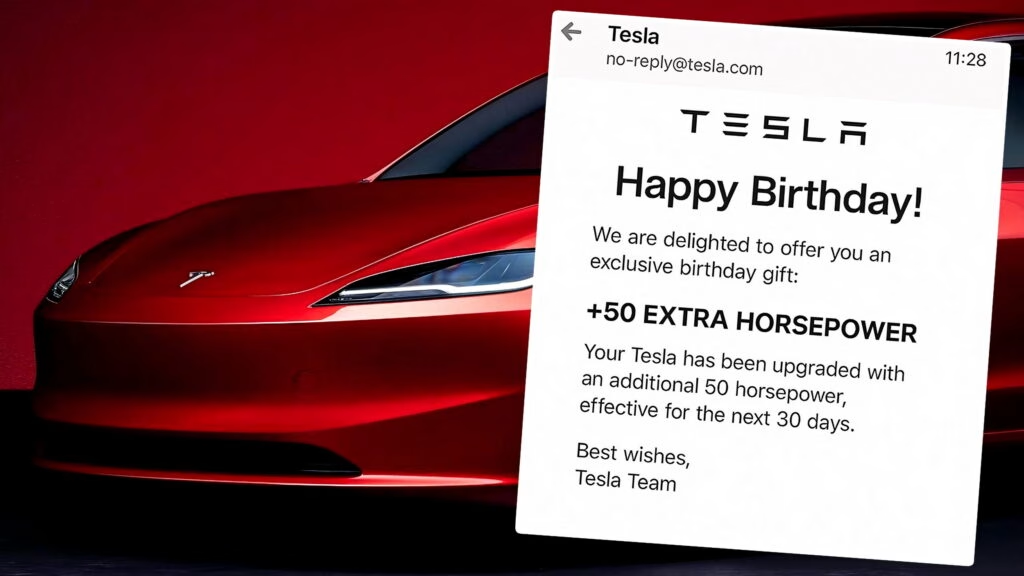Why Did So Many Tesla Owners Fall for a Fake Birthday Email?
Imagine waking up to an email from Tesla, wishing you a happy birthday and promising a 30-day boost of 50 extra horsepower for your car. Sounds like a dream come true for any Tesla enthusiast, right? That’s exactly what happened when one owner decided to pull a prank on the Tesla community by posting a convincing, but entirely fake, birthday reward email on Reddit. The result? Pure magic—and a little chaos.
The email looked official, complete with the right fonts, a no-reply@Tesla.com address, and flawless grammar. It was enough to fool even the most seasoned Tesla fans. The Reddit thread quickly filled with comments from people who either believed the offer was real or wished it were. Some joked about changing their birthday in the Tesla app to score the bonus, while others speculated about future promotions. But beneath the surface, the prank struck a nerve that runs deep in the world of modern car ownership.
What’s the Real Frustration Behind Paywalled Features?
The prank may have been harmless, but the reactions it triggered were anything but. Many owners vented their frustration about features being locked behind paywalls, especially when the hardware is already present in the car. One commenter summed it up perfectly: “If I have the hardware, why would I pay to use the hardware? That’s like buying a computer with 16GB of RAM, only having access to 12, and then getting an email ‘unlocking’ the other 4GB for 30 days.”
It’s not just a Tesla thing, either. The practice of selling cars with built-in capabilities that are only accessible through extra payments or subscriptions is becoming more common across the auto industry. BMW, for example, has offered features like heated seats and adaptive suspension as paid upgrades—sometimes even after the car has left the showroom. According to a 2023 McKinsey report, nearly 40% of new car buyers are now offered some form of subscription-based feature, and the global market for connected car services is projected to surpass $200 billion by 2030.
How Do Automakers Justify Charging for Features You Already Own?
Automakers argue that this model allows them to keep base prices lower while giving customers the flexibility to pay only for the features they want. In theory, it’s a win-win: buyers get more choice, and manufacturers create new revenue streams. But in practice, it often feels like paying twice for the same thing. After all, if your car already has the hardware for extra horsepower or advanced driver assistance, why should you have to pay to unlock it?
Industry experts point out that the real cost for automakers isn’t just the hardware—it’s the ongoing software development, updates, and cloud infrastructure that make these features work seamlessly. Still, the optics can be tough to swallow. As one analyst from J.D. Power put it, “Consumers are used to paying for apps or streaming services, but when it comes to something as tangible as horsepower or heated seats, it feels different. There’s a psychological barrier that automakers haven’t quite figured out how to cross.”
Are There Any Upsides to This Subscription Model?
Believe it or not, there are some benefits to the subscription approach—if you look closely. For one, it allows owners to try out features before committing long-term. Maybe you only want extra acceleration for a road trip, or adaptive suspension for the winter months. Temporary unlocks can make that possible without a huge upfront cost.
There’s also the potential for cars to retain more value over time. If a used Tesla comes with hardware that can be unlocked by the next owner, it could make the vehicle more attractive on the resale market. Plus, over-the-air updates mean your car can actually get better with age—a concept that would have sounded like science fiction a decade ago.
How Are Customers Pushing Back—and Is Change Coming?
Despite the potential upsides, the backlash is real. Social media is full of stories from frustrated owners who feel nickel-and-dimed by paywalls. Some have even organized petitions or called for regulatory action, arguing that if a car is sold with certain hardware, access to that hardware should be included in the purchase price.
There’s evidence that this pushback is having an effect. BMW famously reversed its decision to charge for heated seat subscriptions in some markets after public outcry. Other brands are treading more carefully, offering more transparent pricing or bundling popular features into standard packages. The message is clear: while software-based upgrades are here to stay, automakers can’t ignore the customer experience.
What Can Buyers Do to Avoid Getting Burned?
If you’re shopping for a new car—especially an EV—do your homework. Ask the dealer exactly which features are included and which require extra payment. Read the fine print on software updates and subscriptions. And don’t be afraid to negotiate; some dealers have leeway to include upgrades as part of the deal.
For current owners, keep an eye on community forums and official announcements. Sometimes, limited-time offers or loyalty perks do pop up, and staying informed can help you make the most of your investment. And if you’re feeling frustrated by paywalls, make your voice heard. Automakers are listening—sometimes reluctantly, but they are.
The big takeaway? Modern car ownership isn’t about perfection—it’s about smarter adjustments. Start with one change this week, and you’ll likely spot the difference by month’s end.

